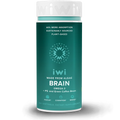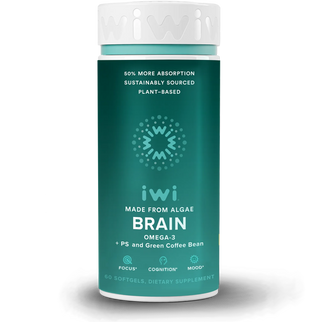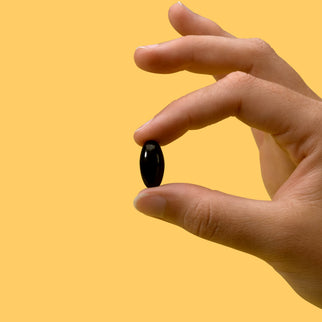Are you feeling like a smartphone with a critically low battery? Mental exhaustion, or simply feeling mentally drained, can feel a lot like that. It's a state where stress, overwork, and life's demands have left you feeling completely depleted.
The pressures of modern day life have increased in the last few years so it’s no surprise that mental exhaustion has been on the rise. Research even shows that burnout is on the rise, and it’s something that can affect anyone.
Here at iwi life, we’re all about looking for sustainable solutions to persistent problems. So, let’s take a moment to understand mental exhaustion and discuss a few ways that you can recharge when you’re feeling mentally drained.
What Is Mental Exhaustion?
Mental exhaustion, also known as mental fatigue, is a state where you're feeling emotionally, physically, and mentally drained due to prolonged exposure to repetitive stressors.
It's not just about feeling a little tired or having lower mental energy levels; it’s a deep sense that you’re emotionally, mentally, and physically overwhelmed and unable to meet constant demands in life. It's almost like carrying a heavy backpack uphill, and the hill just keeps getting steeper.
Without effective interventions, this type of chronic fatigue can start to seriously affect your health, happiness, relationships, wellness, and overall quality of life.
What Are the Common Causes of Mental Exhaustion?
The difficult thing about mental exhaustion is that it’s unique to each person. Global events like the COVID pandemic can impact almost everyone’s mental health, but typically mental exhaustion starts from much more personal events.
Here are a few of the most common culprits that can lead to mental exhaustion:
Chronic Stress
Chronic stress is a constant state of stress that persists over a long period. This can result from high-pressure jobs, financial worries, or difficult personal relationships. It’s essentially the feeling of “fight or flight” being activated, except you can’t do either. The relentless nature of this long-term stress can leave you feeling completely drained and mentally exhausted.
Job Burnout
Job burnout is a specific type of work-related stress that involves a state of physical exhaustion or emotional exhaustion. In some cases, it can even feature a combination of the two. Often, job burnout will also include a sense of reduced accomplishment and loss of personal identity. This condition can develop due to overwhelming workloads, lack of control over your work, or a toxic workplace environment.
Poor Physical Health
Physical health and mental health are closely related and tied directly to one another. If either one of them is impaired, then it will influence the other. If left untreated, chronic illnesses, inadequate nutrition, or a lack of regular physical exercise can all contribute to mental exhaustion.
Not Enough Sleep
Sleep is crucial for our bodies to repair cells, clear toxins, and process information. Unfortunately, sleep is often taken for granted in the modern day and sacrificed. A lack of sufficient sleep can lead to chronic sleep deprivation, which increases the risks of mental exhaustion, impairing your cognitive function, mood, and physical health.
Lack of Support
Feeling unsupported socially or emotionally in your personal life can also lead to mental exhaustion. This can occur when you're dealing with problems alone, feeling isolated, or feeling misunderstood. It’s especially concerning when the loved ones or family members that make up your support system are the ones causing the emotional stress in the first place.
What Are the Common Symptoms of Mental Exhaustion?
Just as there are a variety of causes, the symptoms of mental exhaustion can show up in different ways that can affect every aspect of your life.
Here are some common signs of mental exhaustion:
- Persistent feelings of tiredness and physical fatigue, even after rest. You feel just as tired as when you went to bed, despite getting a full night’s sleep.
- Brain fog or a general difficulty concentrating or decision-making. You feel like your brain is stuck in a thick fog and everything seems slow and muddled.
- Emotional symptoms like feeling drained or detached. You feel like you’re just going through the motions and are largely disconnected from your own emotions or experiences.
- A lack of motivation or lack of interest in usual activities. You feel like the things that you once enjoyed greatly are now a chore, and the color has drained out of your life.
- Physical symptoms such as headaches, stomachaches, or changes in appetite. These symptoms are alarm bells provided by your body that are trying to tell you that something is wrong.
- Decreased immunity, leading to frequent or chronic illnesses. You find yourself catching more colds and other illnesses than usual.
- Poor time management and procrastination. You struggle to stay on top of your tasks and often put important things off until later.
- Changes in sleep patterns, such as trouble sleeping or oversleeping. You might be tossing and turning all throughout the night or sleeping much more than usual as your body can’t seem to decide when to sleep.
How To Recharge When You're Feeling Mentally Drained
Feeling mentally drained can be a huge hurdle, but remember, you're not alone, and there are strategies that can help. Here are 10 effective lifestyle changes to recharge and bring back your spark:
1. Prioritize Self-Care
Just like how you'd make time for meetings or errands, it's important to schedule in self-care. This could be as simple as taking a relaxing bath, reading a book, or just spending some time in nature. Remember, taking care of yourself isn't a luxury, it's a necessity.
2. Eat a Balanced Diet
Your diet can play a significant role in how you feel. Consuming a balanced diet that’s rich in fruits, vegetables, lean proteins, and whole grains can help provide the nutrients your body and mind need to function optimally.
Atiwi life, we believe that good health starts from within, and that includes your mental health. As we mentioned earlier, one effective way to support your mental energy levels is through proper nutrition. For further nutritional support, look no further than our omega-3 supplements.
Omega-3 fatty acids, particularly DHA and EPA, are known for supporting brain health. They’re involved in numerous brain processes, including learning and memory. Not only that, but they can increase blood flow to the brain, support mood regulation, and improve cellular function and communication.
What makes our omega-3 supplements so special is that they’re derived from algae, making them a sustainable and plant-based option. They provide a potent dose of these essential fatty acids, which are unfortunately often lacking in modern diets.
3. Daily Physical Activity
Physical activity is a natural energy booster. It doesn't have to be a strenuous workout; even a brisk walk, yoga, or dancing to your favorite song can help. The idea isn’t to focus so much on what you’re doing but rather how often you’re doing it.Try to perform at least a little physical activity every day, even if it’s only for a few minutes at a time.
4. Get More Sleep
A good night's sleep is like hitting the reset button for your brain. Aim for seven to nine hours each night. If you're having trouble sleeping, consider creating a relaxing bedtime routine or making your bedroom a more sleep-friendly environment.
5. Use Breathing Exercises
Breathing exercises and other relaxation techniques like meditation or progressive muscle relaxation can help reduce stress, lower your cortisol levels, and promote feelings of calm. It's like giving your mind a mini-vacation during the day that can help it relax.
6. Improve Work-Life Balance
Strive for a healthy work-life balance. This might mean setting boundaries, like turning off work emails after a certain time or delegating tasks. It's okay to say no sometimes and prioritize your personal life and health care over work.
7. Practice Mindfulness
Mindfulness is all about being present and engaged in the current moment. It can help reduce stress, increase focus, and improve mental well-being. You can practice mindfulness during everyday activities to help you stay present in the moment and not stressed out about the future.
8. Leverage Social Support
Reach out to your friends, family, or support groups. Sometimes, just talking about what you're going through can provide relief. It's okay to ask for help, and chances are that your support network will love to help you in any way that they can.
9. Take Regular Breaks
Something as simple as taking regular breaks can help prevent burnout and mental exhaustion. This could be a short walk, a few minutes of stretching, or just stepping away from your desk or screens for a moment. Think of it like taking a time-out for your brain and giving it a little time to rest.
10. Seek Professional Help
If you're feeling persistently mentally drained and it's affecting your quality of life, it might be time to visit a mental health professional. Therapists and counselors are highly trained in the world of psychiatry to help you navigate these feelings, develop coping strategies, and identify if a mental health condition could be involved.
The Bottom Line
Mental exhaustion can feel like a big hill to climb, but remember, it's okay to ask for help along the way as you take steps toward improved self-care. Addressing mental exhaustion is crucial for your well-being and quality of life.
The journey may start with recognizing the signs of mental exhaustion and then taking steps like improving your diet, getting more sleep, managing stress levels, and trying supplements like omega-3.
So, why not take a step today? Prioritize your mental health, recharge your mental energy, and explore the world of difference that iwi life's range of omega-3 supplements can make.
Sources
Burnout Is on the Rise Worldwide—And Gen Z, Young Millennials and Women Are the Most Stressed | CNBC
Burnout Phenomenon: Neurophysiological Factors, Clinical Features, and Aspects of Management | PMC
COVID-19 Pandemic Triggers 25% Increase in Prevalence of Anxiety and Depression Worldwide | WHO
Understanding the Stress Response | Harvard Health
The Relationship Between Physical and Mental Health: A Mediation Analysis | NCBI Bookshelf
Feeling Abandoned? How to Cope When Someone Isn't Emotionally Present | Psych Central
Healthy Eating Plate | The Nutrition Source | Harvard T.H. Chan School of Public Health
Exercise: How Much Do I Need Every Day? | Mayo Clinic
How Sleep Works - How Much Sleep Is Enough? | NHLBI
How to Improve Your Work-Life Balance | Business News Daily
Mindfulness Exercises | Mayo Clinic
Breaks During the Workday - Toward a Respectful Workplace | Michigan State University


















